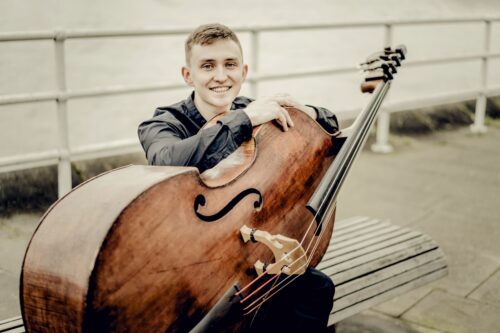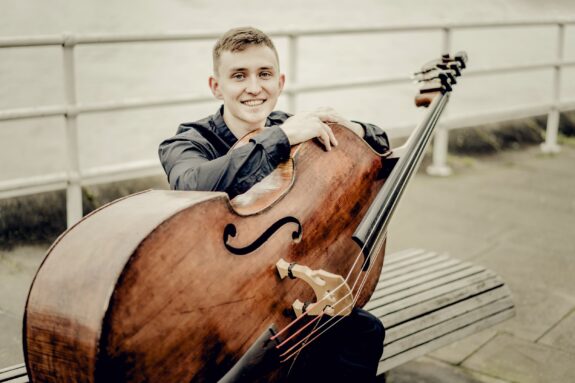 United Kingdom Various: Will Duerden (double bass), Svitlana Kosenko (piano). Wigmore Hall, 4.3.2025. (MBr)
United Kingdom Various: Will Duerden (double bass), Svitlana Kosenko (piano). Wigmore Hall, 4.3.2025. (MBr)

Teppo Hauta-aho – Kadenza
Lowell Liebermann – Sonata for contrabass and piano, Op.24
Reinold Glière – 2 Pieces, Op.32
Adolf Mišek – Legende, Op.3
Lili Boulanger – Nocturne
Giovanni Bottesini – Grande Allegro di Concerto ‘Alla Mendelssohn’
Double Bass recitals are a comparative rarity so it was great to catch this one with Will Duerden at a lunchtime concert at the Wigmore Hall. The instrument can sometimes be something of an unwieldy beast – as I know with my own experiences of it – but it is also capable of producing one of the most glorious sounds of all the string instruments. Muscular and powerful it can sometimes seem neither of those things, such as in the Tubin Bass Concerto where it fights against a vast orchestra. On the other hand, in some of the concertos or Fantasias by Giovanni Bottesini it can be an instrument of capricious virtuosity where almost everything is possible for a soloist equipped to play them.
Duerden’s recital showcased some of the finest works written for the bass, composed by some of the legendary players of the instrument. Opening with Teppo Hauta-aho’s Kadenza – a work that defines the solo bass in the same way as the Cello Suites do that instrument – was inspired. Kadenza is a piece that opens in wonderfully elegiac and dramatic fashion on a tempo of Adagio sostenuto – soon to change to maestoso; but such is its rhapsodic and lyrical colour and tone it never entirely stays there. What is striking about the work is how contemporary it feels in its technical challenges – with long finger slides, arco, double stops. Almost everything the bass can do is there – but it is the pizzicato styles that seem freshest, from tremolo pizzicato to almost thrumming in guitar-like fashion, and often high up on the fingerboard. Duerden was simply superb, exquisite in the sound he produced making the bass sound big, full-toned and deeply rich in colour.
Lowell Liebermann’s Sonata for contrabass and piano is new to me but is in many ways typical Liebermann, not least in the virtuoso piano writing which often brings to mind Prokofiev, especially in a presto-like third section of the work. Are there hints of Verdi’s Otello here – even Bloch? The melody is undeniably beautiful – Duerden’s harmonics and long leaps in the upper register emphasising this in achingly dramatic outline. The tolling, bell-like low keys of the piano find a kind of kinship in longer, drawn out bass notes – perhaps not always as audible as they might have been. What was striking about the performance was Duerden and his pianist, Svitlana Kosenko, giving such contrast to this music it was so clearly there to hear it felt almost symmetrical: the opening and closing intensity, a central climax of dramatic passion and a sudden change of mood that felt almost like the arrival of a summer.
The two Op.32 Reinhold Glière pieces were a good contrast – one a simple tune, the other a rhythmic dance with not a little dexterity and virtuosity to help it along the way. Adolf Mišek’s Legende gave ample evidence that the bass can sing like a cello, especially with vibrato and the warmth of tone and colour that Duerden applied to Mišek’s music. He didn’t need to produce the biggest sound – just a suppleness to the bowing, especially on the lower strings where the rich shades exploded in autumn shades. Lili Boulanger’s Nocturne felt almost Debussyesque beside it, its impressionist colours dripping like fresh paint on canvas.
Bottesini’s Grande Allegro di Concerto ‘Alla Mendelssohn’ is one of his most famous works, and also one of his most virtuoso. Based on the first movement of the Mendelssohn Violin Concerto, it is staggering in its complexity and what it asks the soloist to do on the bass. There was considerable lightness of touch to Duerden’s performance; a buoyancy and fleetness that felt effortless, with nothing that felt heavy or inadvertently insurmountable. The densest of lines, or tutti passages, felt crystal clear; there was an idiomatic sense of the violin melody always there. The cadenza was magnificently done. True, there were very minor intonations issues towards the bridge – but it hardly mattered in a performance as thrilling as this one. With Kosenko’s superb accompaniment, it felt almost orchestral – and always distinctly Mendelssohnian.
This was a recital which showed what a glorious instrument the double bass is, and what a supreme artist Will Duerden is of it.
Marc Bridle
